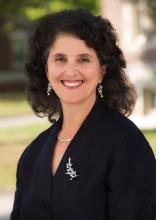TAMPA – The distinct features of substance use disorders (SUDs) in women argue for gender-specific treatment, according to a comprehensive update presented at the annual meeting of the American College of Psychiatrists.
“There is a shorter time between landmarks of SUD progression, and these landmarks are reached at lower doses of alcohol consumed less frequently,” reported Shelly F. Greenfield, MD, chief academic officer at McLean Hospital in Boston.
The rapid progression of alcohol SUD in women is not just related to a greater impact of the same amount of alcohol in a smaller body size, said Dr. Greenfield, also professor of psychiatry at Harvard Medical School in Boston. Rather, women have less alcohol dehydrogenase in the gastric mucosa than men, resulting in decreased first-pass metabolism and greater absorption of pure ethanol. In addition, women have more adipose tissue and less total body water content, which also results in greater alcohol concentrations.“For each ounce of alcohol consumed, the blood alcohol concentration is higher with a greater potential for adverse physical consequences,” Dr. Greenfield said. These physiologic differences may account for the more rapid progression of SUD severity in women, a phenomenon that Dr. Greenfield referred to as “telescoping.” She said the same type of telescoping, defined as “an accelerated progression from the initiation of substance use to the onset of dependence and first admission to treatment” (Psychiatr Clin North Am. 2011 Jun 28;33[2]:339-55), also has been seen among women for opioids and stimulants (Drug Alcohol Depend. 2004 Jun 11;74[3]:265-72). These greater risks are reflected in a higher SUD-associated mortality in females, compared with SUD-associated mortality in males.
Relative rates of alcohol SUD among women have been climbing steadily for more than 30 years. In the 1980s, for example, a population survey estimated the male-to-female prevalence ratio of alcohol SUD as 5:1. Citing subsequent surveys, Dr. Greenfield traced a rapid narrowing of the gender gap. In one of the most recent surveys, the rate had fallen below 2:1. Rates of heaving drinking and binge drinking are now about 1.4:1 in individuals aged 18-25 years.
“Each time we look at this gap, it has narrowed further,” Dr. Greenfield said. In another survey she cited, illicit drug use among adolescents between ages 12 and 17 years was higher in boys, but alcohol use in males and females was essentially the same.
In addition, research suggests that women are more likely to consume alcohol for reasons tied to stress; men are more likely to consume it in celebratory settings or to fit in with a group (Psychol Addict Behav. 1995;9:176-82).Several facts suggest that treatment specific to women will improve outcomes. For one, For another, women are more likely to have co-occurring psychiatric disorders. In one study, anxiety (60.7% vs. 35.8%) and mood disorders (53.5% vs. 28.1%) were nearly twice as common in women with SUDs than in their male counterparts. This is relevant to interventions tailored for females because of evidence showing that treatment for SUDs and co-occurring psychiatric disorders should be integrated rather than addressed independently, according to Dr. Greenfield.
Importantly, “there is evidence of improved treatment outcome in women-focused programs,” Dr. Greenfield said. She suggested that successful programs for alcohol SUD in women not only address gender-specific features but that success can be enhanced further with adjunctive services that address the barriers to treatment, such as child care challenges and stigma – which Dr. Greenfield said is greater in women than in men.
A study called the Women’s Recovery Group (WRG), funded by the National Institute on Drug Abuse and led by Dr. Greenfield, is among those that have reinforced the value of female-specific therapy for SUD (Drug Alcohol Depend. 2014 Sep 1;142:245-53). A manual developed from the study and published in a book she wrote called “Treating Women With Substance Use Disorders: The Women’s Recovery Group Manual” (New York: The Guilford Press, 2016), outlines the principles. Dr. Greenfield said the structured 12-session group therapy for relapse prevention has been effective and well received by women. Some of those women have commented on the reinforcing value of shared experiences.
Up until now, women with alcohol SUD have been commonly treated alongside men, but Dr. Greenfield contended that treatment outcomes with alcohol SUD or other forms of SUDs “can be enhanced by programs that provide services specific to women’s needs.” She believes strategies aimed at addressing the more common histories of sexual or physical trauma and psychiatric comorbidities along with gender-related barriers to treatment have the potential to increase treatment success.
In addition to writing “Treating Women With Substance Use Disorders,” Dr. Greenfield is a coeditor of “Women and Addiction: A Comprehensive Handbook” (New York: Guilford, 2009). She reported no conflicts of interest.



